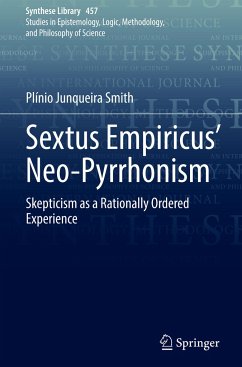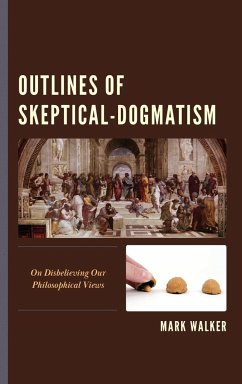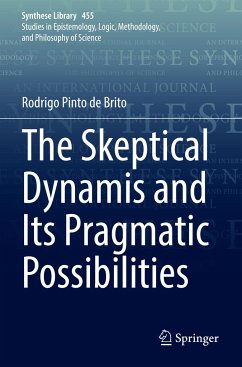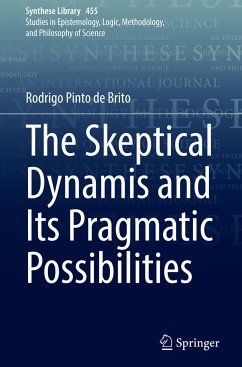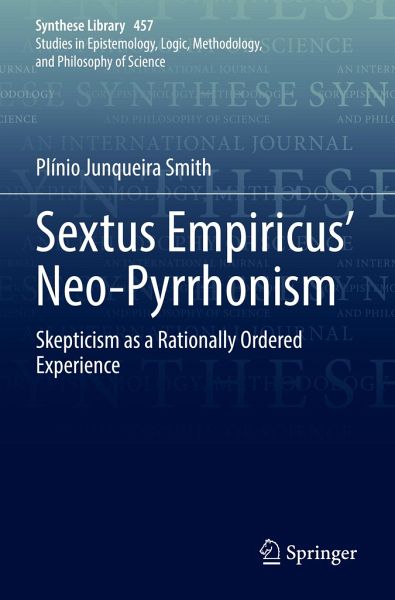
Sextus Empiricus' Neo-Pyrrhonism
Skepticism as a Rationally Ordered Experience
Versandkostenfrei!
Versandfertig in 6-10 Tagen
91,99 €
inkl. MwSt.
Weitere Ausgaben:

PAYBACK Punkte
46 °P sammeln!
This book offers a comprehensive interpretation of Sextus Empiricus based on his own view of what he calls the distinctive character of skepticism. It focuses on basic topics highlighted by this ancient philosopher concerning Pyrrhonism, a kind of skepticism named for Pyrrho: its concept, its principles, its reason, its criteria, its goals.In the first part, the author traces distinct phases in the life and philosophical development of a talented person, from the pre-philosophical phase where philosophy was perceived as the solution to life's disturbing anomalies, through his initial philosoph...
This book offers a comprehensive interpretation of Sextus Empiricus based on his own view of what he calls the distinctive character of skepticism. It focuses on basic topics highlighted by this ancient philosopher concerning Pyrrhonism, a kind of skepticism named for Pyrrho: its concept, its principles, its reason, its criteria, its goals.
In the first part, the author traces distinct phases in the life and philosophical development of a talented person, from the pre-philosophical phase where philosophy was perceived as the solution to life's disturbing anomalies, through his initial philosophical investigation in order to find truth where the basic experience is that of a huge disagreement between philosophers, to the final phase where he finally recognises that his experience is similar to that of the skeptical school and adheres to skepticism.
The second part is devoted to explain the nature of his skepticism. It presents an original interpretation, for itclaims that the central role in Sextus' Neo-Pyrrhonism is played by a skeptical logos, a rationale or way of reasoning. This is what unifies and articulates the skeptical orientation. The skeptic goes on investigating truth, but in a new condition, for he is now tranquil, and he has a skeptical method of his own. He has also acquired a special ability in order to balance both sides of an opposition, which involves a number of different skills. Finally, the author examines the skeptical life generated by this philosophical experience where he lives a life without opinions and dogmas; it is an engaged life, deeply concerned with our everyday actions and values.
Readers will gain a deeper insight into the philosophy of Pyrrhonism as presented by Sextus Empiricus, as well as understand the meaning of anomalía, zétesis, epokhé, ataraxía, and other important ideas of this philosophy.
In the first part, the author traces distinct phases in the life and philosophical development of a talented person, from the pre-philosophical phase where philosophy was perceived as the solution to life's disturbing anomalies, through his initial philosophical investigation in order to find truth where the basic experience is that of a huge disagreement between philosophers, to the final phase where he finally recognises that his experience is similar to that of the skeptical school and adheres to skepticism.
The second part is devoted to explain the nature of his skepticism. It presents an original interpretation, for itclaims that the central role in Sextus' Neo-Pyrrhonism is played by a skeptical logos, a rationale or way of reasoning. This is what unifies and articulates the skeptical orientation. The skeptic goes on investigating truth, but in a new condition, for he is now tranquil, and he has a skeptical method of his own. He has also acquired a special ability in order to balance both sides of an opposition, which involves a number of different skills. Finally, the author examines the skeptical life generated by this philosophical experience where he lives a life without opinions and dogmas; it is an engaged life, deeply concerned with our everyday actions and values.
Readers will gain a deeper insight into the philosophy of Pyrrhonism as presented by Sextus Empiricus, as well as understand the meaning of anomalía, zétesis, epokhé, ataraxía, and other important ideas of this philosophy.





